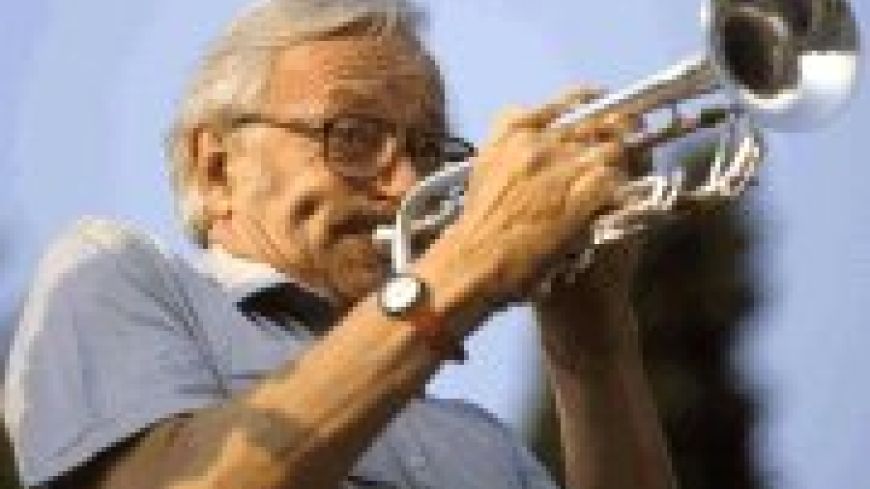
The audience came expecting to enjoy themselves and were not disappointed. The show, comprising archive Lyttelton, traditional jazz, music from the current Cornucopia album and new material from Cornucopia 2 (due for release at the end of the August), was varied, slick, vibrant and fun. It was a consummate performance from a pedigree line-up.
Still fresh at 86, Humphrey has lost none of his enthusiasm, hallmark humour or appetite for composition. His playing was superbly controlled and seemingly effortless. He can make the trumpet growl or whisper but mostly he makes it glide.
He'd written the first number, A good buzz, himself and it got the show off to a foot-tapping start. His interpretation of Mares Eat Oats was inspired by, and proved, Louis Armstrong's view that any tune can be elevated, no matter how banal, if treated with love and respect . It is featured on the current album. His most recent composition Doesn't time fly (when you're enjoying yourself) was conceived in a flash and is a late addition to the forthcoming album.
Tom Rhys-Jones, Adrian Macintosh and Ted Beament on double bass, drums and piano respectively, really shone in solo but also provided the essential backdrop to showcase the other artists. Rhys-Jones' bass was at some times chocolatey, warm rich and mellow, whilst at others it was downright funky. Macintosh played some rattling good snares and delivered very sophisticated brushwork whilst Beament's playing was clean, fluent and agile. His composition, Blue for a blue note was a perfect framework for the talents of all three.
Karen Sharp's number, the fast and lively Wickerwoman, is on the current Cornucopia album. Karen, who looked a tiny figure behind her baritone sax, managed to produce a surprisingly big sound. Humphrey Lyttelton described her as one of the two best baritone sax players in the world, a statement which sounds very likely to be true.
Jo Fookes
Jo Fooks who played as last year's guest is now the newest member of the band and it's easy to see why they wanted her. Particularly impressive was her bluesy playing on Richard M. Jones' Trouble in Mind as it was on her own very attractive composition, M25. She also teamed up on flute with Jimmy Hastings for his own Snow Time inspired by
dancing snowflakes but given a Brazilian rhythm. It was a truly delightful number. Jimmy himself plays a very slinky sax and a mean clarinet. He and Humphrey did a superb clarinet duo on Doesn't time fly… which also featured two saxes and two trombones - enter Ray Wordsworth whose trombone playing was velvety smooth. The arrangement of Making whoopee moved cleverly from big band to late night sound and back.
Ray's mellow distilled approach provided the perfect complement for the special guest Annie Whitehead's bright, lively trombone playing. This was particularly apparent in the legendary Duke's son, Mercer Ellington's Things ain't what they used to be.
Annie brought a vibrant Afro-Caribbean/ gospel feel to the music of the second half as instanced by the soulful, Sakuro (by the late Ali Farka Toure and Ry Cooder), the gospel number, The Lord is Listening to Ya, Hallelujah! and Heaven Less. That and Annie's own tune Blue note bounce provided her with the scope to show off her remarkable ability to coax almost any sound out her trombone.
The final number was a real crowd pleaser, written in Nairobi by Humphrey Lyttelton, Yeh yeh,hha ha, you called your friend a fool. It was brimming with fun and full of sunshine. Duke Ellington's Creole Love Call provided an encore which left the audience chilled out and well satisfied after a high energy, high calibre performance from all eight members of The Humphrey Lyttelton Band and their special guest, Annie Whitehead.
© Ruby Soxer. August 2007. First published on www.edinburghguide.com

